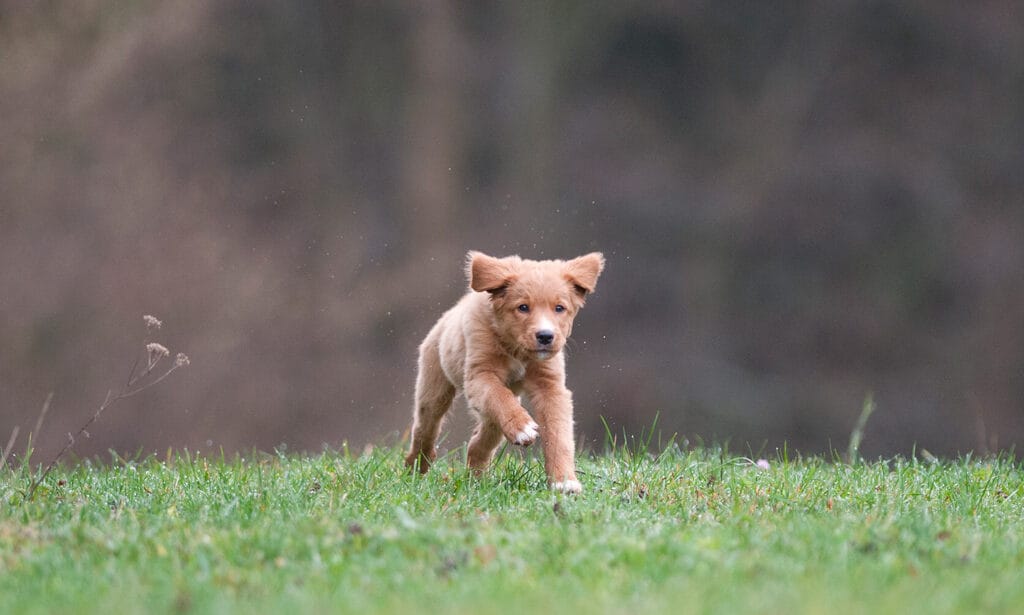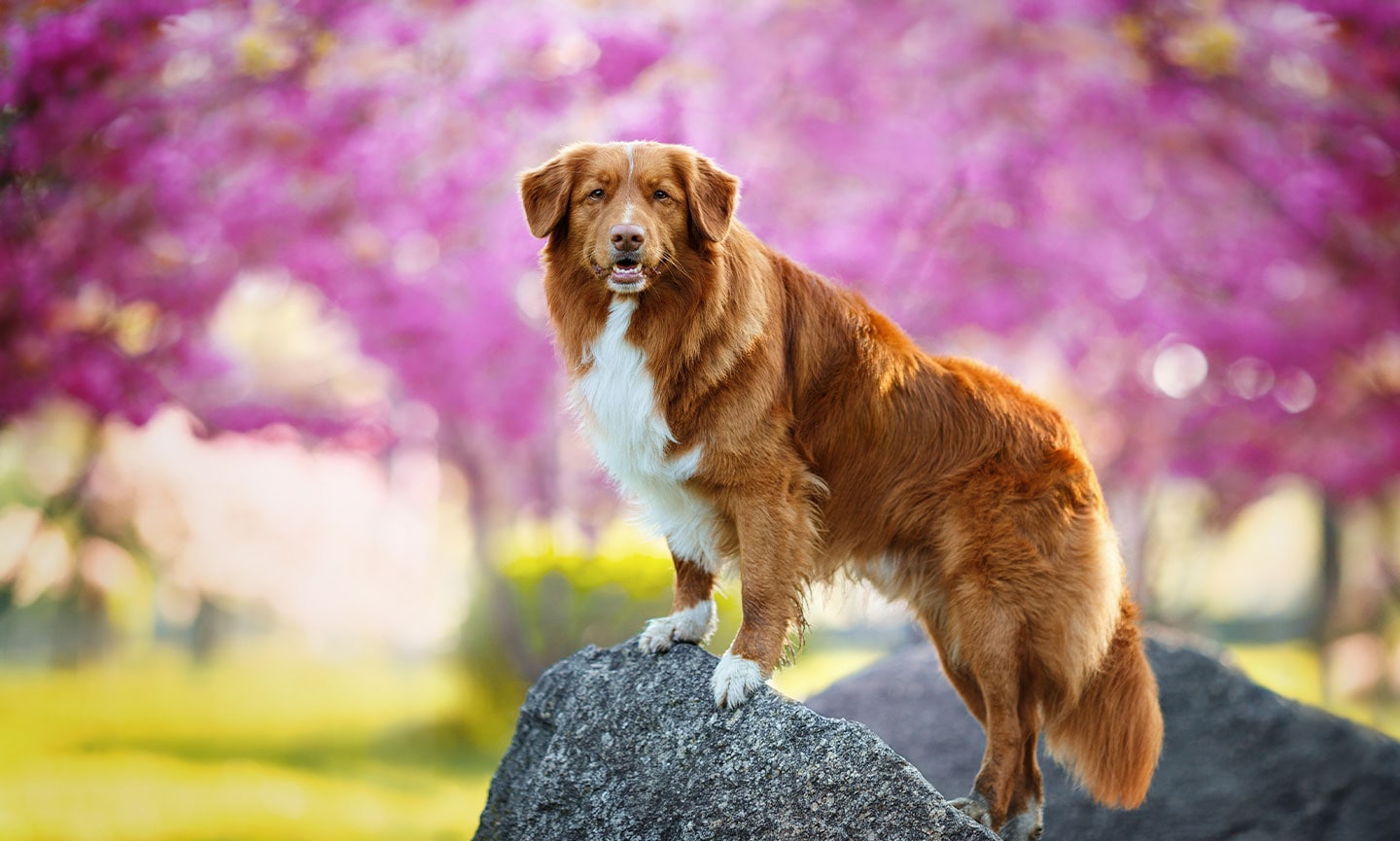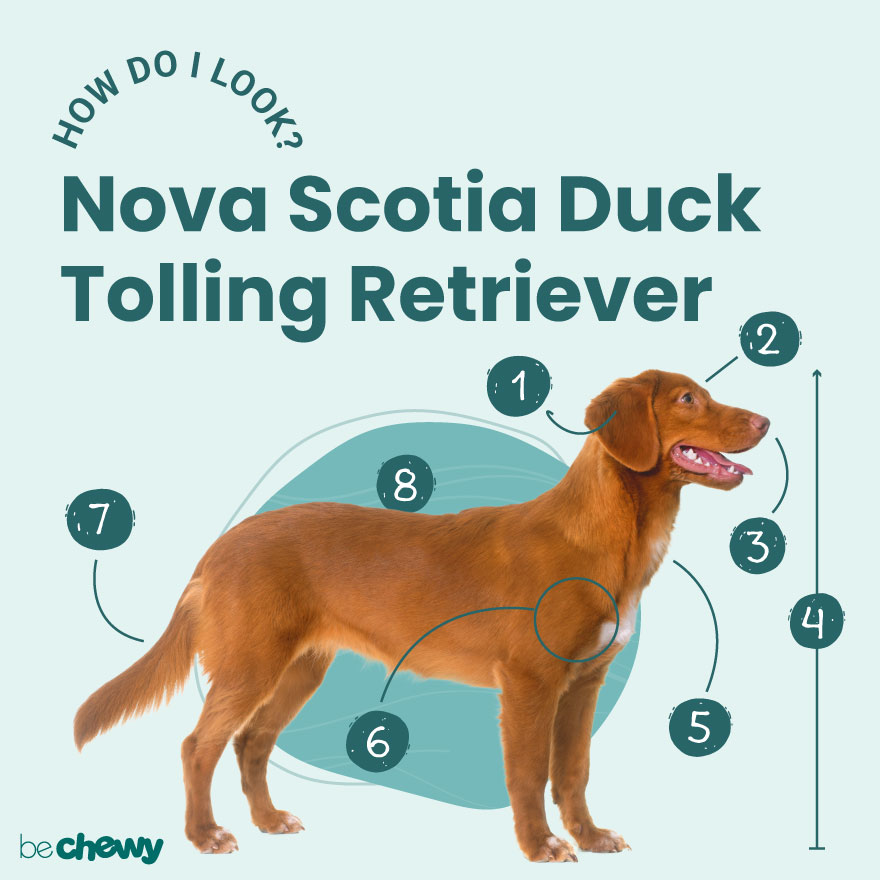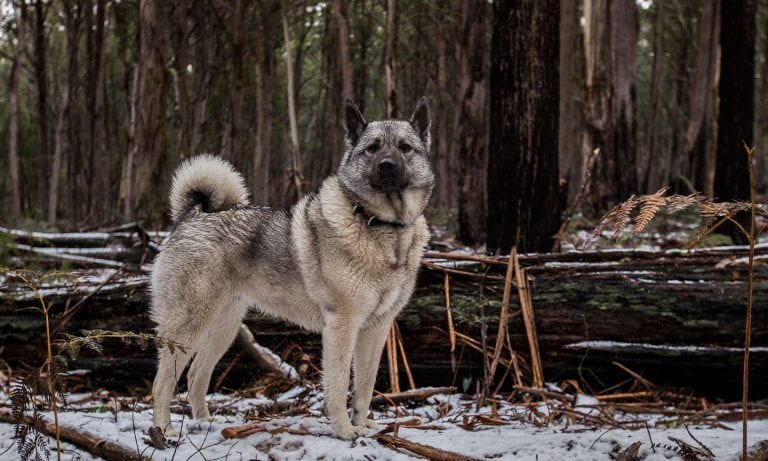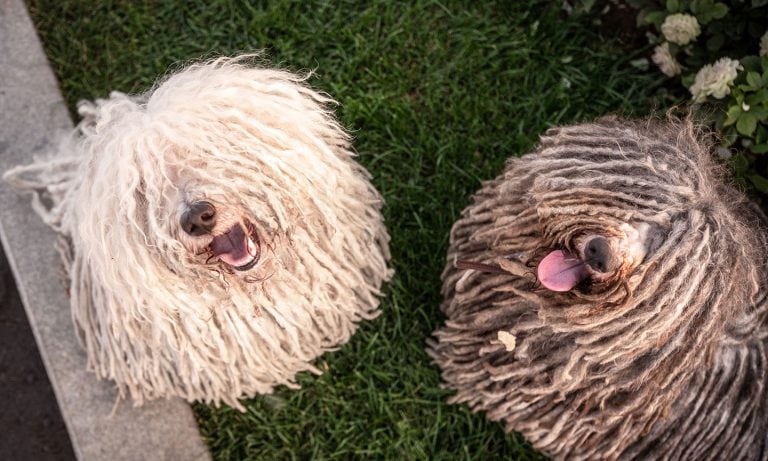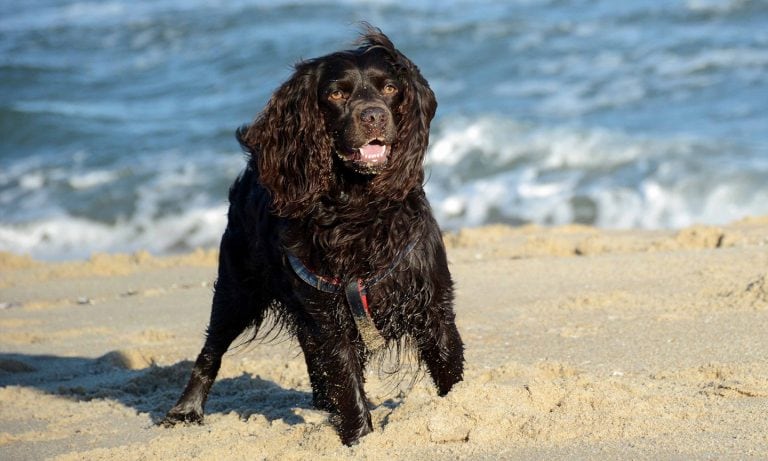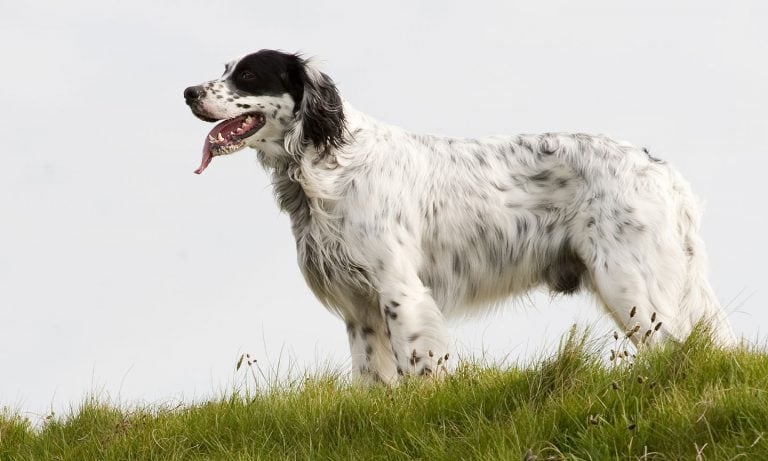If you’ve always wanted a workout buddy who never flakes and will accompany you on your adventures without asking anything in return—except maybe a sloppy kiss—then a Nova Scotia Duck Tolling Retriever could be your new best friend. Tollers are energetic pups who thrive in active households. The smallest of the retrievers, they were bred to run along riverbanks to entice ducks to the shore. So, if “water sports” is your middle name, the Nova Scotia Duck Tolling Retriever is ready to make a splash with you.
Breed Snapshot
Temperament:
EnergeticIntelligentDevotedCoat Color:
RedBuffRed Gold
Best For
Nova Scotia Duck Tolling Retrievers, affectionately known as "Tollers," are a medium-sized sporting dog breed originating from Canada. Renowned for their intelligence, playful demeanor and fox-like red coat, Tollers excel in hunting and do best in active households.
Nova Scotia Duck Tolling Retriever Temperament
The Nova Scotia Duck Tolling Retriever is high-energy, playful and loving with a dash of independence—especially when they get distracted. Their temperament reflects their hunting dog origins. If they’re not hunting, their next favorite thing to do is play with you or a gaggle of kids (a match made in heaven!). They’re also great with other dogs, and if raised around cats as a puppy, they’ll accept felines. Be warned: A Toller dog’s energy level and drive may sometimes be too much for cats.
The Toller breed is a friendly, social and loving dog, so start socializing them while they’re puppies to bring out these wonderful traits as they grow up. Just be warned: pent-up energy will express itself in unwanted behaviors if they don’t get enough physical and mental exercise. These pups are not for people who love the couch more than activity.
How to Care for a Nova Scotia Duck Tolling Retriever
The Toller breed is a gun dog bred for duck hunting. This means they need a job to channel their high energy. They require a lot of physical and mental exercise, confident leadership and obedience training. Tollers are very loving and affectionate, so pet parents committed to respecting their intelligence, playfulness and work ethic will reap the rewards of having this awesome dog to call their own.
Nova Scotia Duck Tolling Retriever Health
Nova Scotia Duck Tolling Retrievers have a lifespan of 12 to 14 years and are a relatively healthy breed without many health problems. But it’s best to be aware of their health issues.
- Hip and Elbow Dysplasia: Dysplasia occurs when the joints don’t form properly, which causes them to rub and result in lameness, pain, and arthritis. Treatments range from weight management to physical therapy to surgery.
- Progressive Retinal Atrophy (PRA): PRA is a degenerative eye disease that eventually causes vision loss. This condition has no treatment, but a pup can still live a happy life with vision loss. A genetic screening test is available, so ask your breeder.
- Addison’s Disease: This is a disorder of the endocrine system where the adrenal glands fail to produce enough hormones for normal function. It usually starts with lack of appetite, vomiting or diarrhea but can be more severe with collapsing and life-threatening low blood sugar, low heart rate, and elevated potassium. Diagnosis is typically a blood test, and with treatment, dogs with Addison’s can live relatively normal lives.
- Degenerative Myelopathy: DM is a neurological disorder that affects the white matter tissue of the spinal cord. The disease usually appears in adulthood, and dogs exhibit gradual muscle atrophy and loss of coordination that typically begins in the hind legs. There is no treatment for this condition at this time, but genetic screening testing is available.
- Degenerative Encephalopathy: With this disease, the region of the brain that’s important in controlling movement and some aspects of behavior degenerate over time. Unfortunately, there are no treatments for this disease.
Nova Scotia Duck Tolling Retriever History
It’s all in a name when it comes to the Nova Scotia Duck Tolling Retriever’s origin. This breed hails from the Little River District of Nova Scotia, where 19th-century sportsmen first bred them. Their nickname, Little River Duck Dog, is an homage to their origins.
Tollers were bred with a particular purpose in mind. These “decoy dogs” are designed to imitate foxes in size and color. Hunters took them along the river banks to act as a decoy to splash along the shoreline and lure curious ducks to shore. (Did you know ducks are fascinated by foxes? They are, though the exact reason why is unclear.) The breed’s name includes a derivative of the Middle English word tollen, which means to lure. Once the ducks came to see what commotion the Tollers were causing, they were poised for hunters to shoot them. The history of the Nova Scotia Duck Tolling Retriever is still evident in the breed’s personality—they are inexhaustible, hardworking dogs capable of retrieving without seeming to stop.
The American Kennel Club recognized the Nova Scotia Duck Tolling Retriever in 2003. Not surprisingly, they are the breed with the longest name in the AKC Studbook.
Hoping to add a Nova Scotia Duck Tolling Retriever to your pack? Find a list of reputable breeders on the American Kennel Club website. What’s the average price for a puppy? You can expect to pay an average of $1,500 to $2,500 for a pup. But for that price, you’re likely getting a pup who’s been screened for health and temperament issues and may come with pedigree papers. You can also contact a Nova Scotia Duck Tolling Retriever rescue organization near you, keep an eye out for the breed at your local animal shelter to adopt a pup, or search Chewy’s database of adoptable dogs in your area.
FAQs
Do Nova Scotia Duck Tolling Retrievers shed?
Yes, Nova Scotia Duck Tolling Retrievers shed moderately and more heavily during the fall and spring. Regular brushing will help minimize shedding, but this breed is by no means hypoallergenic.
Are Tollers good family dogs?
Tollers make great family dogs if you give them plenty of physical and mental exercise. These sporty, working dogs need lots of activity, so they’re best suited for families who can match their energy level.
Do Nova Scotia Duck Tolling Retrievers bark a lot?
Like most dogs, a Nova Scotia Duck Tolling Retriever may bark a lot if left alone all day or for an extended period. Tollers are also known to have a high-pitched scream unique to their breed.
What are the most popular Nova Scotia Duck Tolling Retriever names?
Some of the most popular Nova Scotia Duck Tolling Retriever names are Scout, Lucky, Simba, Chief, Honey, Jack, Penny, Duke, Daisy, Dixie and Rusty. Get more dog names here.
What are the most common Nova Scotia Duck Tolling Retriever Mixes?
The most common Nova Scotia Duck Tolling Retriever types of mixes are:
- Nova Scotia Duck Tolling Retriever-Poodle mix
- Nova Scotia Duck Tolling Retriever-Border Collie mix
- Nova Scotia Duck Tolling Retriever-Golden Retriever mix
- Nova Scotia Duck Tolling Retriever-Husky mix
- Nova Scotia Duck Tolling Retriever-Labrador mix
Note: These are not purebred dogs but mixed breeds.
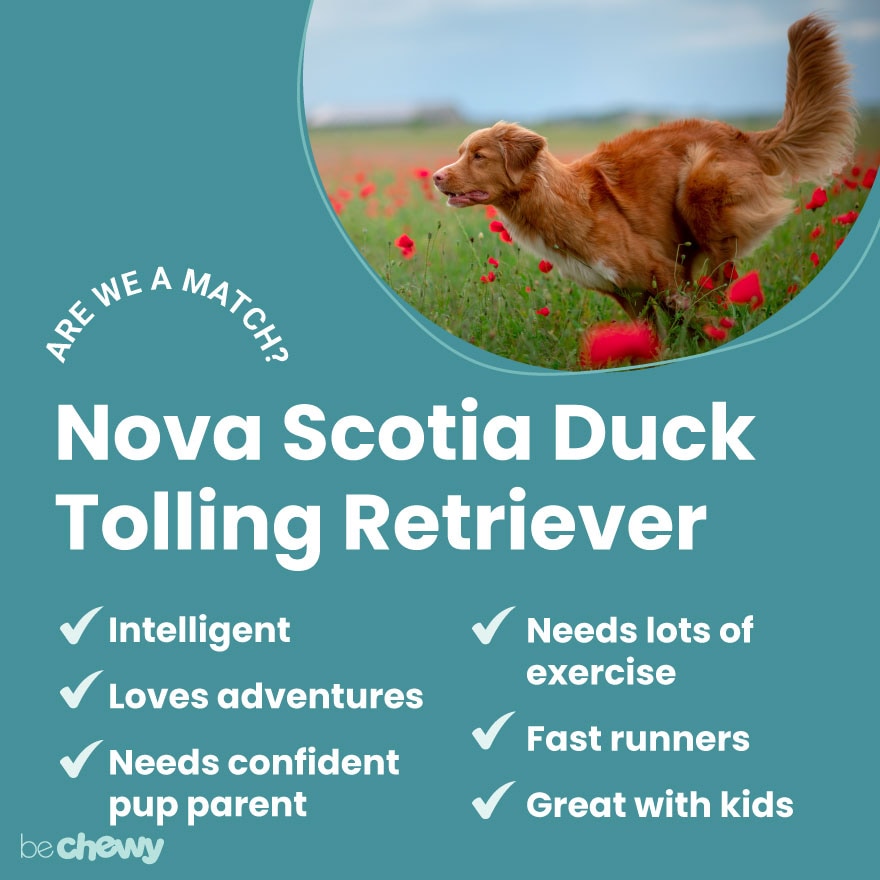
Top Takeaways
You’ll get the best of both worlds with a Nova Scotia Duck Tolling Retriever: a tireless, sporty companion as well as a dog who loves to cuddle. These highly intelligent working dogs need to be exercised—and did we mention they love the water? Their constant desire to play and retrieve will be appreciated by active families looking for a dog who matches their high energy level.
Expert input provided by Dr. Jerry Klein, Chief Veterinary Officer for the American Kennel Club, Dr. Elizabeth Grey, Veterinarian, President and Hospital Director of Carmel Mountain Ranch Veterinary Hospital, and owner of Dr. Grey’s Play & Stay, and Graham Bloem, Certified Dog Trainer & Behavior Expert, Owner & Training Director of Specialty Dog Training.
Breed characteristic ratings provided by veterinarian Dr. Sarah J. Wooten, DVM, CVJ, a veterinarian at Sheep Draw Veterinary Hospital in Greeley, Colorado; dog trainer and behavior consultant Irith Bloom, CPDT-KSA, CBCC-KA, CDBC, owner of The Sophisticated Dog, LLC, in Los Angeles; and certified animal behavior consultant Amy Shojai, CABC, in Sherman, Texas.
The health content was medically reviewed by Chewy vets.
Top Nova Scotia Duck Tolling Retriever Names
These are the top Nova Scotia Duck Tolling Retriever names as chosen by Chewy's pet parents!
Female Names
- Ruby
- Nova
- Sadie
- Luna
- Moxie
- Lily
- Lucy
- Maple
- Sandy
- Hazel
Male Names
- Tucker
- Cooper
- Finn
- Murphy
- Apollo
- Milo
- Gunner
- Goose
- Whiskey
- Ranger
Share:




